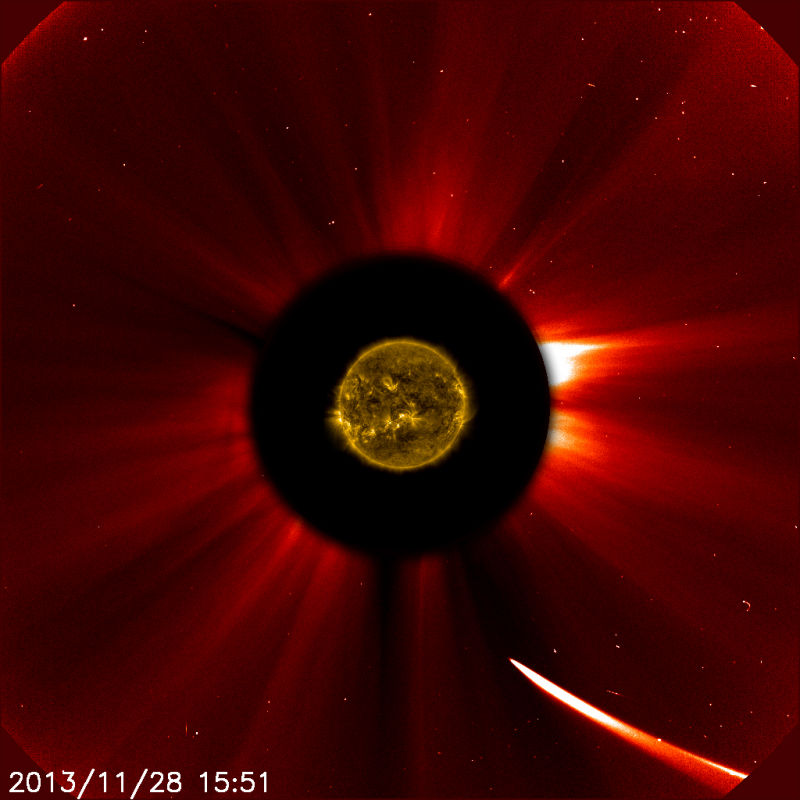Eyes on the sky: Comet ISON underscores changing interests in space
Courtesy of ESA&NASA SOHO/SDO
ISON grazes the sun on its visit to the solar system. The comet has piqued interest in space, something that has waned recently.
December 2, 2013
Comet ISON left stargazers with a dramatic cliffhanger during Thanksgiving break: Would it survive its trip around the sun?
The sun-grazing comet, on a hyperbolic trajectory around the sun, is paying the inner solar system the only visit it ever will from what Charles Kerton, associate professor of physics and astronomy at Iowa State, said is a reservoir of comets found outside the solar system called the Oort Cloud.
“ISON is one of these visitors from the Oort Cloud,” Kerton said. “Something gave it a little kick at some time and started it heading in, and it’s just falling in towards the sun just because of gravity.”
Kerton said the speed of the comet would whip it around the sun and on its way, providing, of course, the sun did not tear it apart. Initially assumed to have been destroyed, at least part of the comet remained intact after coming to its closest point in proximity to the sun on Thanksgiving Day, Nov. 28.
On Nov. 30, the NASA Comet ISON Observing Campaign’s update on the comet was that what was left over was “a faint, diffuse, cloud with no obvious central condensation.”
The comet drew many eyes upward and opened up room for discussion about space, something that has historically captivated Americans’ interest. That interest, however, may have changed over time.
“I would argue that we’re not as interested in space as we once were,” said Dirk Deam, senior lecturer of political science. “We don’t have anybody that we’re particularly competing against or any other form of national urgency that would cause us to take this realm more seriously than we would otherwise.”
If indeed overall interest in space has waned since the Space Race era, the economy may have also been a contributing factor, particularly when it comes to publicly funded programs.
“I think since the Apollo program and the moon landing, Americans have generally shifted their interest away from space, especially with the economic difficulties now,” said Logan Prust, senior in aerospace engineering. “A lot of people just don’t see it as something that’s worthwhile compared to other things.”
Samantha Glick, senior in physics, said research on space is still important and can lead to some of the technology that is used by the general public every day. Cellphones, for example, require satellites.
“We can’t predict what [one] little discovery will change for the world in 20 years,” Glick said.
Glick referred to the field as being in a transitional phase from one that is heavily government funded to becoming a more privatized one.
Companies such as SpaceX independently pursue the goal of enabling humans to eventually live on other planets, according to the SpaceX website.
“What we do as a field [is] we prioritize,” Kerton said. “Ultimately, it comes back to the public whether they want to fund and the level they want to fund these projects. The science community kind of sets the science direction, sets the priorities and then the nation as a whole has to decide whether it wants to fund the agencies that can do those things.”
At Iowa State, the attendance at planetarium shows has shown there is still regular interest in space.
Alan Hulsebus, graduate in the physics and astronomy department, said the monthly planetarium shows can draw more than 100 people out at a time.
“I think [space is] something that everyone can relate to,” Hulsebus said. “You can go outside and look up, you know, at the night sky and stare at it and wonder.”
Kerton referenced accessibility as a potential reason people can be captivated by an interest in space.
“I think, for a lot of people, it’s a hobby that lets you get outside if you are interested in space. It’s something that’s accessible to a lot of people,” Kerton said.
A simple pair of binoculars can allow a viewer to catch sight of many celestial occurrences, such as comets like ISON.
“There’s still the background interest in exploration, there’s still the background interest in astronomy and things that happen in the heavens,” Deam said. “But the imperative that was present in those earlier years in the 1960s is no longer with us because there’s no political context in which that could occur.”
While part of Comet ISON appeared to have survived its close encounter with the sun, at least for a while, only time will tell whether the same can be said for the American public’s general interest in space.

















